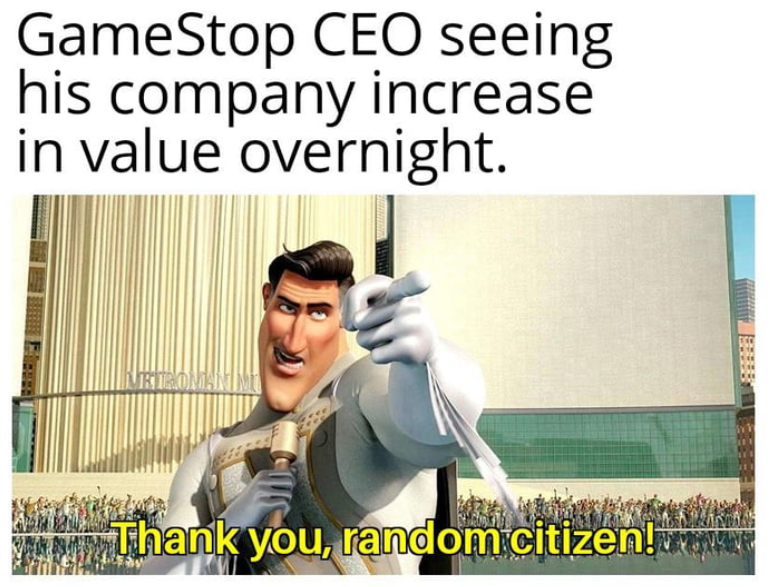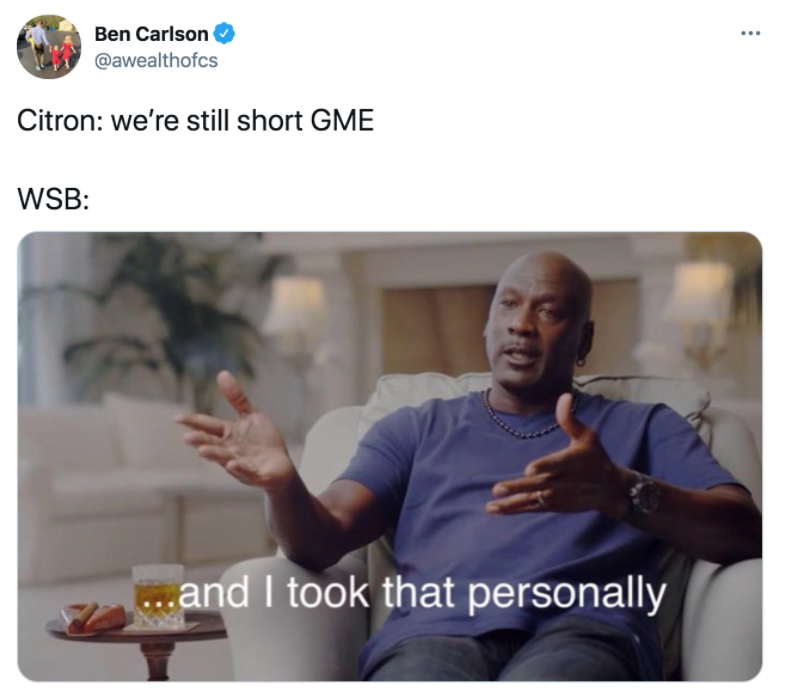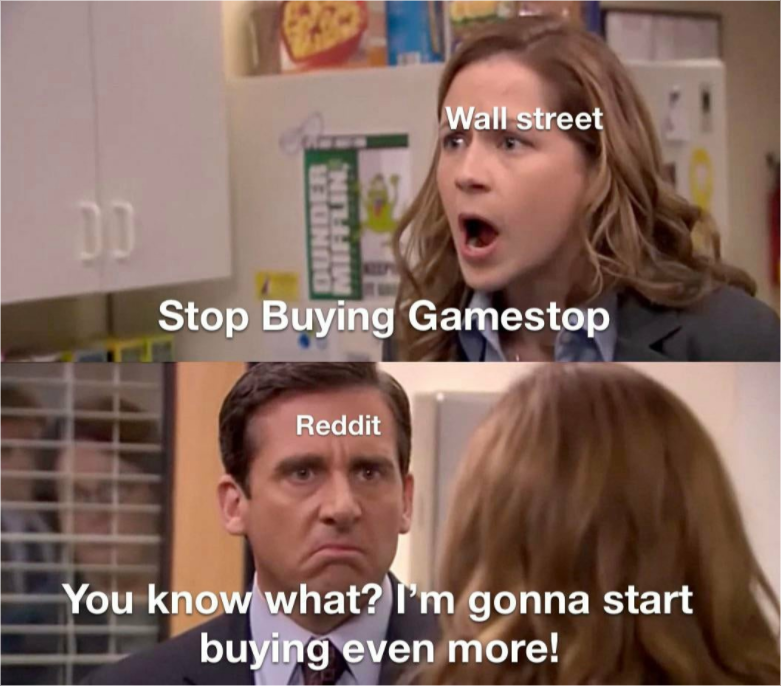Supply, Demand, and Memes: GameStop's 1 Year Anniversary
By Eshan Gupta and Neil Tamhankar
Can you earn money only when a stock goes up? Short answer: No. Long answer: Short selling. A short position is taken by an investor when they bet against a stock, or they want a stock price to fall. How does it work, you ask? The investor first “borrows” a stock from their broker. Say for example, Jay wants to short Apple. He will borrow 10 shares of Apple from his broker when the price is $100 and he will sell it immediately at the market price. Now, Jay has the “revenue” from selling the stock, but still owes his broker 10 shares. So, he will hope that the stock price eventually falls. Let’s say that hypothetically, Apple’s stock price fell to $80 the next day. Now, Jay can buy 10 shares of Apple at $80 and return those stocks to his broker. Guess what? Jay earned money when the stock price fell. The math:
10 shares * $100/share = $1,000 revenue
10 shares * $80/share = $800 “expenditure” or stock buyback cost
Profit = $1,000 - $800 = $200
If you take a short position and the stock increases, then you’d lose money. For example, let’s say the stock went to $120. Then, you’d have to buy back the shares at $1,200 to give them back to the broker. You’d have a $200 loss in this scenario ($1,000 [Revenue] - $1,200 [Cost]). You can also wait for the stock to go below $100 and you can “cover” to buy back the stocks to “close” your short position by returning the broker their shares.
Shorting is a very risky way to earn money since a lot of companies don’t lose a lot of value. Even so, they have unlimited potential for growth and you can actually get into a lot of debt if you aren’t able to buy back the stock! Unlimited loss potential! For example, say Apple’s share price went to $1,000 and Jay didn’t buy the stock to return it to his broker. Now, he has to pay $10,000 to buy the stocks back! That puts him at a loss of $9,000 ($1,000 [Revenue] - $10,000 [Cost]). With shorting, you can lose more than what you invested. But if you invest “normally” (long position), then the maximum you can lose is how much you invested in. In a different instance, if Jay buys 1 Apple stock at $100 (not shorting it), then he can only lose $100 if Apple’s stock price drops to $0.
Hedge funds quite often take this risky approach and bet that a stock’s price will fall after carefully studying the company and its operations. They short the stock by massive amounts to earn profits. A negative side-effect of this is that hedge funds’ shorting reduces investor confidence in a company. If tomorrow Melvin Capital announces that it’s shorting Tesla, then investors are going to rely on Melvin’s research for shorting the stock and they’ll sell their holdings, causing the stock price to ultimately fall. This further worsens investor confidence and the low stock prices reduces firms’ ability to raise capital and create jobs for people. This is why short selling is regarded as bad for the economy. How does this tie into meme stocks? Let’s see.
One year ago today, the GameStop ($GME) short squeeze began as hedge funds saw a not-so-bright future for GameStop and they started to bet on its collapse. A short squeeze is when the price is driven up, destroying the position of the short seller. Towards the end of 2020, the hedge fund Melvin Capital had decided to short GameStop. One year ago today, the internet said “Nope.”
A few factors combined to create an environment in which individuals on the internet could defeat a massive hedge fund. Firstly, this was smack-dab in the middle of the pandemic, and there was (and still is) a general feeling of frustration and anger. It wasn’t hard for that anger to be directed at rich people betting on a company that everyone loves going under. A lot of people had also been financially ruined during the pandemic. Combine that with the fact that GameStop is a beloved company that many of today's millennials have fond memories of as children, and when people heard a bunch of millionaires are betting on GameStop failing, the straw broke the camel’s back. The floodgates opened, and the rage was mainly focused on r/WallStreetBets, a subreddit that became the headquarters of the short squeezers.
Citron is another hedge fund that shorted Gamestop.
The WallStreetBets community was instrumental in the GameStop short squeeze. Their objective was simple: buy shares of GameStop, drive the price up, and put Melvin Capital out of business. At the time, there was a frenzied air, and all that excitement was focused in WallStreetBets. There was a culture of “sticking it to the man”, an almost Robin Hood-like mission of bringing down the rich (Robin Hood the archer, not the trading app). And no one was more dedicated to this mission than Keith Gill, also known as RoaringKitty. Gill was the de facto leader of the WallStreetBets community. He made Youtube videos about the short squeeze and encouraged people to keep pushing the price up. He popularized the use of phrases like “diamond hands” , meaning holding onto the stock no matter what, and “to the moon”, a phrase of hope that GameStop’s price would go “to the moon”.
GameStop was what is now known as a “meme stock”. Meme stocks are stocks that have gained a nearly cult-like following on social media and experience extremely high volatility. High volatility implies that since the stock price is being “artificially” pumped by retail investors’ high demand, the stock forms a bubble. It’s important to keep in mind that nothing about GameStop has really changed: they haven’t made any announcements of new shopping experiences or partnering with Amazon that would potentially increase their stock price. Bubbles have an annoying tendency to pop and the stock price usually falls after stock surges because nothing about the company itself changes to influence the change in the stocks’ value. The other major meme stock that WallStreetBets focused on was AMC. In June 2021, a few months after the GameStop short squeeze ended, AMC rode the Reddit wave and rose from $16.41 to $62.55 between May 25 and June 2. The stock gradually went down and is currently at a price of $22.99.
The actual short squeeze lasted from January 2021 to March 2021. In that time period, GameStop rose to a high of $347.51. It started 2021 at a price of $19.94 and ended the year at a price of $148.39.
What’s going on with Gamestop in the present? Just a few days ago, on January 7, Gamestop’s stock price jumped from $131.01 to $159.77 (about 20%), showing that the stock still has quite a bit of volatility. Gamestop is also starting an NFT marketplace, most likely in an attempt to stay relevant. Only time will tell if they are successful.
Please note that we highly discourage rookie investors from relying on sources like r/WallStreetBets to make investment decisions. There’s a lot of risk in meme stocks because the “bubble” can pop any time, so always trade them with caution.



